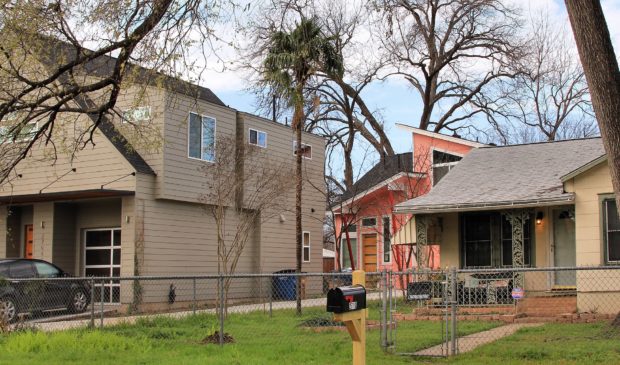About the Author
Chad Swiatecki is a 20-year journalist who relocated to Austin from his home state of Michigan in 2008. He most enjoys covering the intersection of arts, business and local/state politics. He has written for Rolling Stone, Spin, New York Daily News, Texas Monthly, Austin American-Statesman and many other regional and national outlets.
Newsletter Signup
The Austin Monitor thanks its sponsors. Become one.
Most Popular Stories
- Latest State of Downtown report shows the city core’s businesses and housing are in transition
- Cap Metro to shelve 46 new electric buses for a year after manufacturer bankruptcy
- Jesús Garza disputes allegation that he violated city ethics rule
- Mobility Committee hears public concern regarding expansion of MoPac
- Council gives first reading OK to major development on tiny slice of land
-
Discover News By District

City names anti-displacement officer as real estate prices climb
Friday, April 16, 2021 by Chad Swiatecki
As Austin’s real estate prices continue to soar, the city has named a new point person in charge of reducing the displacement of residents from affordable housing units.
Nefertitti Jackmon recently started her new role as the community displacement prevention officer within the Housing and Planning Department. Jackmon previously worked on programs related to displacement in that department, but the new position points to the growing problem of residents being forced out of low- and middle-income housing by development pressures or other issues.
As the former head of the Six Square cultural district in East Austin, Jackmon has seen the effects of the city’s housing supply not growing fast enough to meet the demand created by thousands of new residents arriving each year.
Jackmon said strategies such as an equitable development fund would be helpful to add to affordable housing bonds approved by voters in 2018, as well as affordability considerations built into the Project Connect transit initiative.
“The need and demand is here for the city to make a more robust response … it’s essentially a crisis for lower-income communities and communities of color because they’re not able to keep up with maintaining affordable homes in stable communities,” she said. “It comes down to being able to shift some of the power by asking the people who are most impacted and able to make decisions about how their communities should be protected, how they’re developed to ensure equity.”
“We’ve got to find a way to engage those communities in the decision-making process.”
Displacement prevention will take many forms, from creating citywide plans for preserving and creating affordable units to providing assistance to residents facing evictions or other problems that could force them out of their homes.
Jackmon said there are no new programs or initiatives in the works that would require City Council approvals, with one priority being moving ahead with plans to increase the capacity of community development corporations that build affordable housing.
“We have to be able to preserve housing stock that is currently affordable, but in addition to that we have to continue to build affordable and mixed-use housing, provide a multitude of options, like more duplexes, because what we need to see in Austin is a variety of housing types and more of it, so there’s not just one model and more choices on the market at a variety of pricing levels,” she said. “The city can’t build fast enough all the housing we would need to address the need that exists, so one of the ways we can solve that is to build up the capacity of community development corporations with the mission to build affordable housing.”
Mayor Pro Tem Natasha Harper-Madison described displacement as being at a crisis level in her East Austin district as well as other parts of the city’s Eastern Crescent. She said Jackmon’s time with Six Square and her other roles in the community have given her a balanced perspective.
“Her commitment to preservation is not superseded by her commitment to affordability and building new housing stock … she’s not too far in either direction of tear it all down and build new stuff or save everything regardless of how run-down it is, and it’s the good, pragmatic place to be,” Harper-Madison said.
“We have a lot of income-restricted housing but a lot of that stock is old … so part of the strategy is going to have to be how to reasonably preserve our aging housing stock that generally is multifamily and located on the east side as well as a few in South Austin, and it’s all starting to be compromised from an infrastructure standpoint.”
Photo by Larry D. Moore, CC BY-SA 4.0, via Wikimedia Commons.
The Austin Monitor’s work is made possible by donations from the community. Though our reporting covers donors from time to time, we are careful to keep business and editorial efforts separate while maintaining transparency. A complete list of donors is available here, and our code of ethics is explained here.
You're a community leader
And we’re honored you look to us for serious, in-depth news. You know a strong community needs local and dedicated watchdog reporting. We’re here for you and that won’t change. Now will you take the powerful next step and support our nonprofit news organization?








